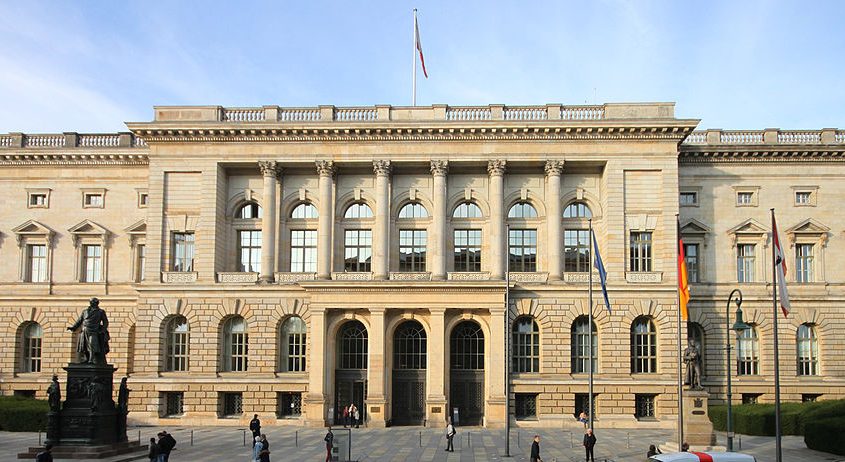
Berlin’s Extraordinary Election

Daniel Hellmann
Institute for Parliamentary Research
Daniel Hellmann is a research associate at the Institute for Parliamentary Research in Berlin and at the Institute for political science at the Martin-Luther-University Halle-Wittenberg. Elections, electoral systems, and especially electoral management are his main research topics. Among others he contributed to the #BuKa2017 project that investigated the in-depth mechanisms of candidate selection in Germany. Currently he researches the long-term trends of candidacies for elections in the German multi-level system (CandiData-project). In his PhD, he focuses on the quality of electoral management in Germany.
Flaws, Failures, and Their Consequences
Peter Müller, a constitutional judge, described the elections that took place on September 26, 2021, in the city-state of Berlin as follows: “One could have imagined such a thing some decades ago in some dictatorial so-called developing country, but not in the middle of Europe, in the middle of Germany.” On that day, several circumstances came together that pressured the electoral management in Berlin: three simultaneous elections (at the federal, state, and municipal levels), a referendum, the Berlin Marathon, and the still raging COVID-19 pandemic. In the end, the results of at least two of those elections were declared invalid by the Berlin constitutional court, and these elections will need to be run again on February 12, 2023, which is a nearly unique occurrence in Germany. So, what happened on September 26 and why will there be a rerun?
For a start: What went wrong on election day? One of the first problems was the waiting times of up to two hours in front of voting stations, which is remarkably long by German standards. The queues were caused by a mixture of reasons. The first was the clustering of voters: because of COVID-19 precautions and other reasons, some electoral districts ended up with no more than two voting stations. The second was the simultaneity of all the elections, which implied that each voter had to handle five ballots (one for the federal election, the referendum, and the municipal elections and two for the state election in Berlin) and ended up being not as fast as electoral managers seemed to have hoped. All this combined with a very high turnout of 75 percent, and the people lined up to vote.
Additionally, not every voting station had enough ballots to start with. Usually, it would not be a problem to deliver more ballots to voting stations that need them, but due to the Berlin Marathon, streets were blocked and several polling stations were unreachable. Poll workers in those situations had two options: either print new ballots themselves—if a printer was available—or close the polling station until new ballots arrive. Both options meant potentially jeopardizing the legal certainty of the election. After the polls officially closed at 6:00 pm, some polling stations stayed open for up to half an hour longer to allow every eligible voter who wanted to cast their vote. This again causes legal problems because these voters potentially had access to the first projections of the results that are published at 6:00 and could adapt their voting behavior accordingly. Finally, ballots for different districts had been mixed up beforehand—meaning that ballots with the candidates for one district ended up in another voting station—making these votes invalid. According to calculations by the state constitutional court, 20,000 to 30,000 votes were flawed in some way, which would have had implications for the seat distribution.
Already, the failures in electoral management have been detrimental to the otherwise high levels of electoral integrity in Berlin and by extension possibly Germany as a whole. Hence, it is crucial that the rerun of the Berlin elections is conducted as flawlessly as possible.
On election day, local newspapers started reporting on the flawed election and, due to political and public pressure, the state election administrator Petra Michaelis stepped down only a few days later. It is still debatable whether and how much she was to blame for the chaos. While in theory the election administrator is responsible for the conduct of the election, she held no real administrative or legal power to enforce good electoral management. Instead, the situation of electoral management in Berlin (and, to a lesser extent, in all other German states as well) can be described as a collective absence of responsibility. The system depends on collective coordination, which apparently failed in this instance.
Second, what was done about the electoral irregularities? To conduct an extensive investigation into the flaws of the Berlin election, an expert commission consisting of eighteen members was installed. Their recommendations suggested, among others, strengthening the state election administrator’s position and specifying responsibilities in the electoral process. One of its members, Stephan Bröchler, was later selected to become the new state election administrator. Meanwhile, the elected parliaments (Bundestag, Abgeordnetenhaus (the Berlin Landtag, or state parliament), and Bezirksverordnetenversammlungen (the body for local districts)) started their business as usual. For each, election electoral scrutiny was conducted. Interestingly, the way Berlin conducts this process is different from all other German states. For example, on the federal level, the Bundestag installs a parliamentary committee on electoral scrutiny. This committee investigates electoral flaws. If the Bundestag (following the committee’s proposal) rejects an electoral complaint (which is nearly always the case), the appellant is allowed to file a complaint at the Federal Constitutional Court. In Berlin, on the other hand, there is no parliamentary investigation, and the state constitutional court is the only one ruling. Irrespective of the process, there is one major question electoral scrutiny needs to answer: if there was an electoral irregularity, could it have affected the distribution of seats?
The constitutional court of Berlin answered this question on November 16, 2022, with a definitive yes. Even though it did not find evidence of irregularities in all districts, it suggested that the state election, and by extension the municipal elections as well, need to be rerun entirely. The court argued that these elections were thoroughly flawed and suspected that, even after intensive investigation, only the tip of the iceberg was known. This decision is disputed, not least because the committee on electoral scrutiny of the German Bundestag came to a different conclusion in regard to the federal election in Berlin which was plagued by the same problems as the Berlin state election. They concluded that the federal election only needs to be rerun in 431 of the 2,300 polling stations. This is partially due to the smaller impact the flaws in Berlin had on the overall federal election compared to their impact on the Berlin state election. But the committee based its decision also on the reasoning that reruns are only necessary where flaws could have impacted the seat distribution. Thus, federal and state elections will be rerun differently on different dates even though they took place simultaneously and were plagued by the same flaws. While there are good reasons for these different outcomes (different impacts on overall election results, different processes of electoral scrutiny) it will be difficult to explain this to the average citizen.
As of now, the elections for the Abgeordnetenhaus and Bezirksverordnetenversammlungen will be repeated on February 12, 2023. Currently, the federal constitutional court must consider whether to address the rerun of the state election and if so, whether it must stop the total rerun of the election. If the judges of the federal constitutional court do not interfere, which is a likely scenario, the election will be repeated with the same parties and candidates as in the 2021 election, even if they already have different offices or have left their party. Candidates who died or left Berlin were erased from the registers. While it is not unusual that extraordinary elections take place, for example, due to the dissolution of parliament, a rerun occurs rarely. Only once before in Hamburg in 1991 was a state election repeated due to mistakes in candidate selection.
Finally, what are the consequences? Already, the failures in electoral management have been detrimental to the otherwise high levels of electoral integrity in Berlin and by extension possibly Germany as a whole. Hence, it is crucial that the rerun of the Berlin elections is conducted as flawlessly as possible. It is hard to point out which version—either a total rerun or a rerun in only a small number of districts—is least harmful to the trust in the integrity of elections. The damage has already been done and that there are two different ways of repeating essentially the same electoral process does not help communicating to and rebuilding trust with the broader public, too. Maybe never in German history was it as important that an election is conducted properly.






